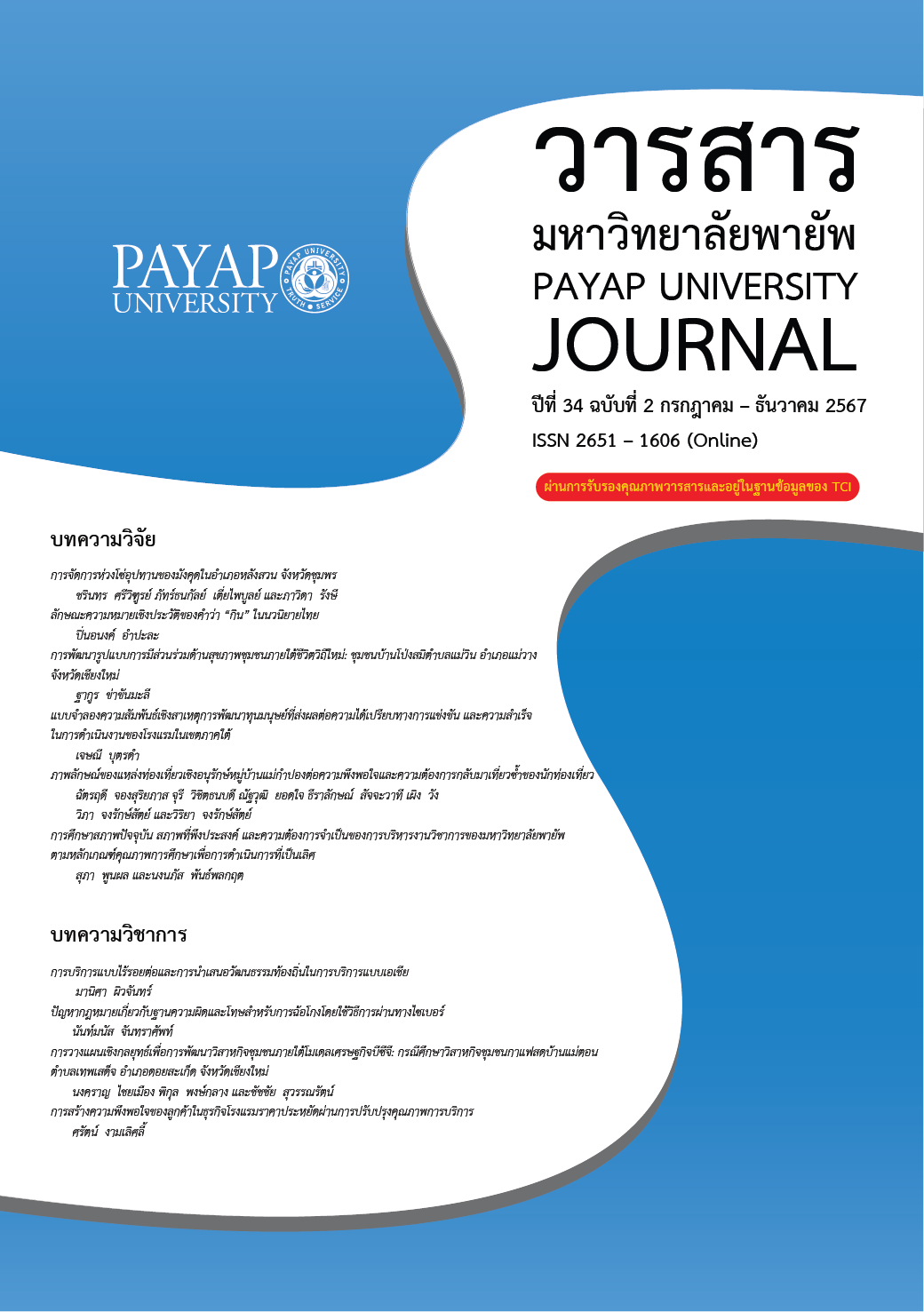แบบจำลองความสัมพันธ์เชิงสาเหตุการพัฒนาทุนมนุษย์ที่ส่งผลต่อ ความได้เปรียบทางการแข่งขัน และความสำเร็จในการดำเนินงาน ของโรงแรมในเขตภาคใต้
Main Article Content
บทคัดย่อ
การวิจัยนี้มีวัตถุประสงค์เพื่อศึกษาแบบจำลองความสัมพันธ์เชิงสาเหตุการพัฒนาทุนมนุษย์ ที่ส่งผลต่อความได้เปรียบทางการแข่งขันและความสำเร็จในการดำเนินงานของโรงแรมในเขตภาคใต้ เป็นการวิจัยเชิงปริมาณ (Quantitative Research) ใช้แบบสอบถามในการเก็บข้อมูลจากผู้ประกอบการหรือฝ่ายทรัพยากรมนุษย์ของโรงแรมใน 14 จังหวัดภาคใต้ อัตราส่วนจำนวนหน่วยตัวอย่างต่อจำนวนพารามิเตอร์ 20 ตัวอย่างต่อ 1 พารามิเตอร์ การวิจัยมีจำนวน 16 พารามิเตอร์ จำนวนขนาดของ กลุ่มตัวอย่างที่เหมาะสมเท่ากับ 320 ตัวอย่าง (Steven,1986) ผู้วิจัยเก็บตัวอย่างจำนวน 350 คน
ผลการศึกษาพบว่า การวิเคราะห์แบบจำลองมีความสอดคล้องกลมกลืนกับข้อมูลเชิงประจักษ์ Chi-square = 57.339; df = 42; p = 0.058; CFI = 0.995; GFI = 0.976; AGFI = 0.948; TLI = 0.990; RMSEA = 0.032; CMIN/DF = 1.365 ทดสอบสมมติฐาน พบว่า การพัฒนาทุนมนุษย์มีอิทธิพล ทางตรงต่อความได้เปรียบทางการแข่งขัน และมีอิทธิพลทางอ้อมต่อความสำเร็จในการดำเนินงาน ส่วนความได้เปรียบทางการแข่งขันมีอิทธิพลทางตรงต่อความสำเร็จในการดำเนินงาน ควรพัฒนา ทุนมนุษย์ในทุกด้านเพื่อเตรียมความพร้อม สร้างความได้เปรียบทางการแข่งขัน ส่งผลต่อความสำเร็จ ในการดำเนินงาน และพัฒนาองค์กรอย่างยั่งยืน
Article Details
เอกสารอ้างอิง
Announcement on the 13th national economic and social development plan (2023-2027). (2022, November 1). Royal Gazette. Volume 139, Special Issue 25, pp. 9-11. https://www.nesdc.go.th/article_attach/article_file_20230307173518.pdf (In Thai)
Chakkaphak, P. (2021). Human capital development approach in public administation. Journal of MCU Social Science Review. 10(2), 354-363. https://so03.tci-thaijo.org/index.php/jssr/article/view/251295/169593 (In Thai)
Department of Business Development. (2019). Hotel Business in the South. Business Analysis Report, 1-5. (In Thai)
Haseeb, M., Hussain, H., Kot, S., Androniceanu, A., & Jermsittiparsert, K. (2019). Role of social and technological challenges in achieving a sustainable competitive advantage and sustainable business performance. Sustainability, 11(14), 3811. https://doi.org/10.3390/su11143811
Khaosung, W. (2017). Human resource development innovation affecting hotel business success in 3 southern border provinces. The Journal of Pacific Institute of Management Science (Humanities and Social Science). 4(1), 181-199.
https://wb.yru.ac.th/xmlui/bitstream/handle/yru/4474/177425-Article%20Text-504884-1-10-20190313. pdf?sequence=1&isAllowed=y (In Thai)
Lalitsasivimol, W. (2016). The structural equation model human capital development affecting the competitive advantage for performance success of private businesses in Songkhla province. MUT Journal of Business Administration. 13(2), 79-99. https://so04.tci-thaijo.org/index.php/journalmbsmut/article/view/77284/62017 (In Thai)
Lunkam, P. (2023, 22 January). Tourism and hotel business after COVID-19. https://www.krungsri.com/th/research/research-intelligence/ri-future-of-tourism-21 (In Thai)
Matchuang, O., Pratoom, K., & Chantharachaturaphat, P. (2015). The relationship between human capital management and competitive advantage of small and medium-sized enterprises (SMEs) in Northeast Thailand. Journal of Humanities and Social Sciences Mahasarakham University, 34(4), 214-222. (In Thai)
Mondy, R. W. & Noe, R. M. (1996). Human resource management (6th ed.). Prentice Hall.
Peetiwan, P. (2021). Human capital development guideline for internation hotel chains after COVI–19 pandemic. [Master’s thesis, Silpakorn University]. DSpace at Silpakorn University. http://ithesis-ir.su.ac.th/dspace/bitstream/123456789/3672/1/631220107.pdf (In Thai)
Stevens, J. (1986). Applied multivariate statistics for the social sciences. L. Erlbaum Associates.
Thanapatra, V. & U-on, V. (2019). The model of competitive advantage for small hotel in Thailand. Journal of Interdisciplinary Research: Graduate Studies. 8(2), 465-475. https://so03.tci-thaijo.org/index.php/JIRGS/article/view/243881/165058 (In Thai)


